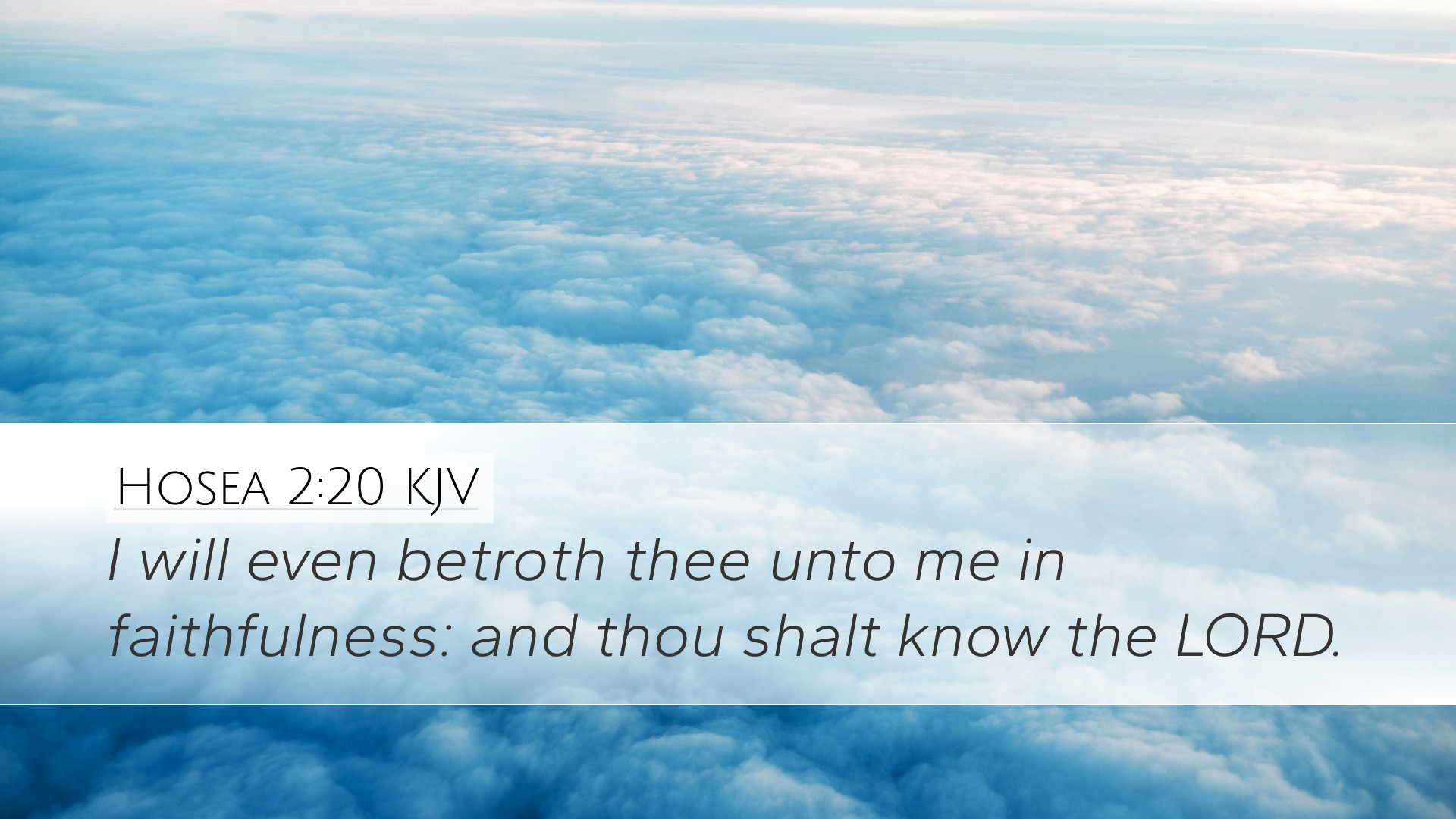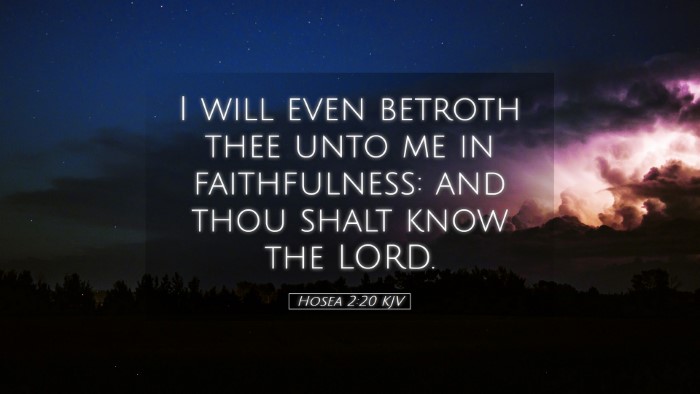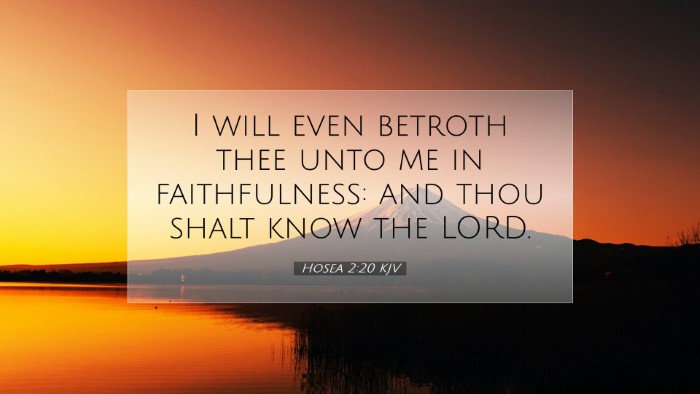Old Testament
Genesis Exodus Leviticus Numbers Deuteronomy Joshua Judges Ruth 1 Samuel 2 Samuel 1 Kings 2 Kings 1 Chronicles 2 Chronicles Ezra Nehemiah Esther Job Psalms Proverbs Ecclesiastes Song of Solomon Isaiah Jeremiah Lamentations Ezekiel Daniel Hosea Joel Amos Obadiah Jonah Micah Nahum Habakkuk Zephaniah Haggai Zechariah MalachiHosea 2:20
Hosea 2:20 KJV
I will even betroth thee unto me in faithfulness: and thou shalt know the LORD.
Hosea 2:20 Bible Commentary
Commentary on Hosea 2:20
Verse: Hosea 2:20 - "I will betroth thee unto me in faithfulness: and thou shalt know the LORD."
Introduction
The book of Hosea is a poignant narrative that showcases the profound relationship between God and His people, Israel. The metaphor of marriage serves as a key thematic element throughout the text, illustrating both the covenant love of God and the unfaithfulness of Israel. Hosea 2:20 encapsulates a pivotal moment in this narrative, emphasizing God's commitment to reconciling His relationship with His people.
Historical Context
Hosea, a prophet during a tumultuous period in Israel's history, provided a voice of warning and hope amidst rampant idolatry and moral decay. The Northern Kingdom, having turned away from the worship of Yahweh, faced inevitable judgement. Yet, God, through Hosea, expresses His desire for restoration and fidelity. The significance of a divine betrothal highlights not only judgment but also God's unwavering promise of redemption.
Verse Analysis
"I will betroth thee unto me in faithfulness:"
- Divine Commitment: This statement reflects God's intention to establish a renewed covenant. The Hebrew term for "betroth" (ארשׂ) indicates a binding promise, akin to a marriage vow that underscores loyalty and love.
- Agency of Faithfulness: The term "faithfulness" (אֱמוּנָה) suggests not only God's reliability but also hopes for Israel's responsiveness. This faithfulness is fundamental in maintaining the covenant relationship.
"and thou shalt know the LORD."
- Knowledge of God: The knowledge referred to here (יָדַע) goes beyond mere intellectual awareness; it implies an experiential and intimate relationship. It suggests a deep understanding of God’s character—His mercy, grace, and righteousness.
- Restoration and Transformation: This promised knowledge highlights a transformative process whereby Israel turns back to God, leading to a genuine reconciliation and revival of true worship.
Theological Implications
- Covenant Theology: This verse echoes the theological principles found in covenant theology, emphasizing that the relationship between God and humanity is based on divine initiative and promise. It suggests God's sovereign role in redemption and restoration.
- Faithfulness as a Divine Attribute: The declaration of faithfulness not only affirms God's nature but also challenges believers to reflect this attribute in their own relationships. It serves as a poignant reminder that faithfulness is non-negotiable in all covenantal relationships.
- Call to Repentance: The call for Israel to "know the LORD" beckons both repentance and revelation. It portrays the necessity for believers to seek a deeper understanding of God, leading to repentance and renewal.
Application for Today
- Understanding Our Relationship with God: Believers today are invited to reflect on their own fidelity to God. Just as God desires an intimate bond with His people, individuals are encouraged to evaluate their faithfulness to Him.
- The Importance of Faithfulness: In an age that often prioritizes convenience over covenant, this verse reminds pastors, students, and theologians of the imperative to uphold faithfulness in their ministries and personal lives.
- Encouragement for Restoration: For those feeling distanced from God, the promise of betrothal serves as an encouragement that reconciliation is not only possible but desired by God. This offers hope and comfort in times of spiritual barrenness or crisis.
Conclusion
Hosea 2:20 serves as a powerful reminder of God’s unwavering commitment to His people. The imagery of betrothal evokes a sense of love, loyalty, and intimacy that God desires with humanity. In scholarly reflection upon this verse, it is crucial for pastors, students, and theologians to grasp both the historical context and the profound theological implications it bears for the relationship between God and His people. The call to know the LORD is an invitation to a deeper, transformative relationship that should resonate in the hearts and lives of all believers.


